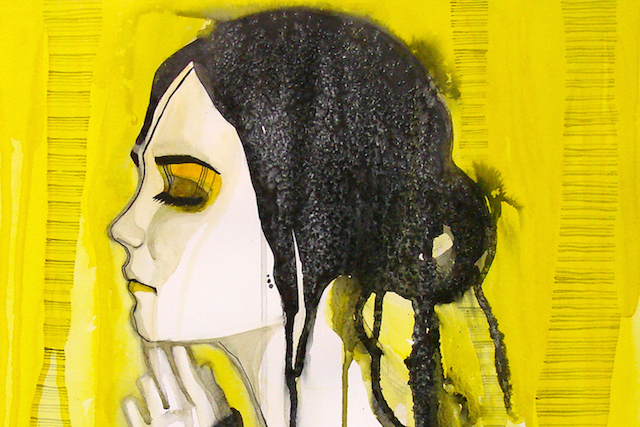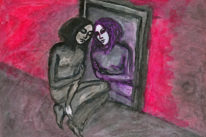
“We are like the little branch that quivers during a storm, doubting our strength and forgetting we are the tree—deeply rooted to withstand all life’s upheavals.” ~Dodinsky
I began struggling with anorexia and bulimia in high school, a development that, in part, stemmed from sexual abuse.
I internalized my struggles and made them a part of me, leaving me with feelings of shame, guilt, unworthiness, and despair. I had completely lost connection with my authentic self and instead, took on the roles of “ruined,” “broken,” and “worthless.”
If you had asked me who I was three years ago, I would be stumped. I would get as far as my name and follow it with “I have an eating disorder.” Even after my recovery, my eating disorder was still a big part of my identity.
I became the protagonist, but my “self” was more about the plot than actual character development. I allowed myself to be defined by external events and situations instead of unveiling my raw authenticity, values, and assets.
My true self was masked by what had happened to me. Somewhere within the storms of my life, I lost myself and adopted a lesser, superficial version of Kelly.
I felt fragile and unsteady, walking on eggshells and avoiding anyone or anything that may elicit a potential hurt or disappointment.
I began numbing myself from unpleasant feelings, and consequently, pleasant feelings as well. I felt empty inside and weighed down with memories of my past. My life was robotic, predictable, and lacked both meaning and direction.
The thoughts I had adopted about myself became my truth. I believed, wholeheartedly, that I was nothing more than my eating disorder, my trauma, and my circumstances.
It’s easy to take pain, disappointment, and unfavorable life events and internalize them. We struggle with these unpleasant experiences and let them weigh us down when we fail to separate ourselves from them.
By making our past hurts a part of our being, we carry with us unbearable emotional baggage and become overwhelmed by grief, resentment, and anguish.
It is vital, then, to find separation between who we are and what has happened to us.
The best analogy I have come up with to visualize this separation is to view myself as a tree. After struggling for years with pain from my past, I began looking deeper into my being, digging up the roots of what really lies within.
The rain and wind of life’s troubles seemed to uproot me and bend my branches to the point of breaking, and the aftermath of these emotional storms left me feeling scattered, weak, and exhausted.
I found an everlasting steadiness when I began viewing my true self as the trunk of the tree—the unshakable core.
Within this strong and centered point lied my authenticity—my heart, my values, and the myriad of quirks that made me, me. This part of me is protected with layers of bark, which the storms can no longer penetrate.
Instead, the rains of my pain, disappointment, and unfavorable life events became external, rapidly beading off and nourishing my roots, no longer making me feel shaken, but nurturing me for growth.
This is not where the pain ends; this is where it begins. We are shaped by our experiences, not defined by them. They are, in a way, part of us.
Some of these reminders stay with us longer than others. They are the leaves that cover our branches. Some fall as winter comes, and time kisses our wounds; and yet others stay with us through the seasons.
They are each unique and beautiful in their own way, shielding us like an umbrella of strength, protecting us from internalizing similar hurts in the future.
Whether bare or full, a tree is a tree. Whether hurt or healing, the external experiences of life cannot change the constant steadiness that is our core—our heart, our unshakeable sense of self.
Who you are is not what has happened to you. The lost are never really lost; even after years of struggling with anorexia and bulimia, and losing myself to my experiences, something still existed deep within, waiting to be found again: the true Kelly.
I encourage you to dig deep, to penetrate the soil, and follow the roots to your heart. There you will find the eternal essence that is you.
About Kelly Joyce
Yogi. Writer. Photographer. Optimist. Recovered from anorexia and bulimia and helping others to do the same. Finding a balance in life and learning to live whole-heartedly. Embracing change and accepting that whatever will be, will be.












 Though I run this site, it is not mine. It's ours. It's not about me. It's about us. Your stories and your wisdom are just as meaningful as mine.
Though I run this site, it is not mine. It's ours. It's not about me. It's about us. Your stories and your wisdom are just as meaningful as mine.
Thank you for this beautiful post, Kelly. It reminds me of what I have been experiencing and learning during the last year. Your words are very soothing, beautiful to read – they brought some tears to my eyes and made my heart open up wide. 🙂
Well written post, Kelly. You are so right – the external experiences of life cannot change our core! In my own life, I’ve found pain and struggle to help me also get to my true self. To help me discover a place of authenticity and to get to a place, where I can grow and heal. Our past and our pain brings us back to our authentic self – removing the layers that we’ve built up over a lifetime and removing the walls we’ve created to protect our heart. Love the tree analogy and how you say you’ve been nurtured for growth:) Best wishes on your continued journey to your highest self and thank you for a dose of inspiration for the rest of us.
Great message! One of the most important things I’ve learned is that we don’t have to be the person we used to be, if we choose not to.
Kelly I love the metaphor of the tree and how the hurts of the past and what happens to us is like the bark, not the core centre of our being. My question is HOW do we successfully make this separation between who we are and the unfortunate experiences we live through? How do we stop internalising?
I think you pose a really good question. The most important step in differentiating our true identity from our experiences is an honest reflection in ward. Ask the hard questions; who am I? What roles do I play? What do I value? What are my positive attributes and talents? Think about the person you’d be if the negative life experiences never happened- because that is still your true essence. Like a 20 dollar bill, Your worth does not change whether you are crumpled up or stepped on., you hold the same value you’ve always had. I would also recommend picking up and reading a copy of “The Happiness Trap” by Dr. Russ Harris – it’s based on the principles of acceptance and commitment therapy (ACT), which focused on differentiating oneself from thoughts, feelings and seeing them for what they truly are- merely words, stories, and images- not necessarily truths.
Wishing you health, happiness, and love,
Kelly
THANK YOU Kelly, you’ve given me something powerful to think about and work with. I will also read the book you’ve recommended. Bless you!
BEAUTIFUL post and message!!!!!! 🙂 I love when you said “It is vital, then, to find separation between who we are and what has happened to us.”